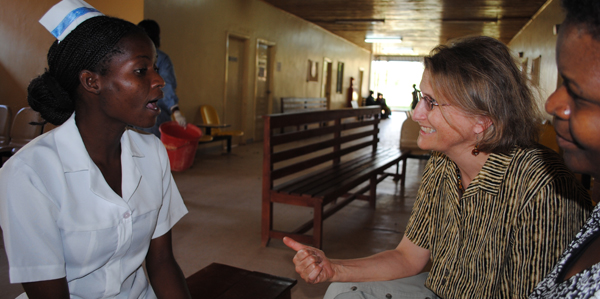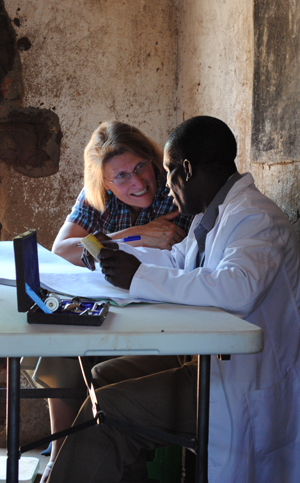AIDS: The Struggle Continues
Ellen S. Schell, RN, PhD, director of International Programs for the Global AIDS Interfaith Alliance and an associate adjunct professor in the UCSF School of Nursing, reflects on the 30-year battle against HIV/AIDS in this perspective.

Ellen Schell, RN, PhD, director of International Programs for the Global AIDS Interfaith Alliance and an associate adjunct professor in the UCSF School of Nursing, talks with a nursing student in Malawi.
I was a 29 year-old newly-minted nurse when I cared for my first AIDS patient here in San Francisco. Back then, we called the virus that so terrifyingly attacked the immune system HTLV-III.
Later, it would be renamed HIV. It made patients miserable victims of infections and cancers that we couldn’t seem to treat.
No one was sure how contagious the agent was, so hospital protocol called for us to completely gown, glove, and mask each time we entered the room. These “moon suits” further distanced us from our patient, a young man who was 24 years old and terrified of dying. I can still see the pleading look in his eyes. We couldn’t save him; all we could do was keep him comfortable with morphine, and try to assuage his terrible loneliness and anger.
30 Years of AIDS
Special web package
Thirty years later, I continue to work on this illness, but now on the other side of the globe, in Malawi, Africa.
The medical miracles that have restored to health so many U.S. citizens living with HIV are not yet available to millions in developing countries. For its shortfalls, the American health care system has made extraordinary gains in treating HIV-positive patients. With good care, vigilant adherence to drug therapy, and a touch of luck, they can expect to live a normal life span. Continuing improvements in medication regimes have made drugs simpler to take and reduced side effects. American women who are HIV-positive can expect that they will not transmit the virus to their babies.
In Malawi, a tiny, impoverished country of 15 million, the battle is still uphill, with nearly as many people living with HIV as in the U.S., and far more (51,000 — three times as many as in the U.S.) dying each year. And in Malawi, too, remarkable progress has been made. About one third of people with advanced AIDS have access to antiretroviral therapy, and newly diagnosed patients stand a better chance than ever of surviving with improved therapies. Public education campaigns and community efforts have done much to help people understand about the transmission of the disease, what they can do to stop spreading it, and the importance of being tested and treated.

UCSF's Ellen Schell talks with a clinical officer, like a physician assistant, in Malawi.
Still huge challenges remain, as evidenced by the two thirds of people with advanced AIDS who do not have access to life-saving drug therapies. The majority of Malawians live in rural areas that are hard to reach, on poor roads, and without electricity. Many lack access to clean water. The country’s health care workforce is inadequate, with under 300 physicians in the country and only about 5,000 active nurses.
In the context of the global economic crisis, large international donors have pulled back, and programs have been cut or curtailed. Poor markets for Malawi’s agricultural products have resulted in a shortage of hard currency so the country struggles to purchase enough gasoline and diesel for its needs. This ends up affecting supply chains, and hospitals and clinics cannot get essential medicines and supplies.
It is my privilege to join with Malawian colleagues in this work. Hundreds of Malawian health professionals struggle bravely in this fight, committed to making progress. They need the continuing support of people in the developing world. San Francisco and UCSF has always been a beacon in this struggle. We lead the world in research, foster dynamic biotech companies that constantly improve treatment, and are home to world famous models of care, like San Francisco General Hospital.
UCSF faculty and staff have collaborated on research projects and generously provided advice and support to non-governmental organizations like GAIA for years. We have won many battles, but the war is not over--especially for people in sub-Saharan Africa. Let’s keep focus as the struggle continues.
About the Author
Ellen S. Schell, RN, PhD, has served since 2001 as the International Programs Director for Global AIDS Interfaith Alliance (GAIA), a Bay Area nonprofit that provides basic health services targeting prevention, care, and support in communities affected by HIV, AIDS, TB and malaria in Africa.
She earned her PhD degree at the UCSF School of Nursing where she is an associate adjunct professor. She is a Fellow of the American Academy of Nursing. She was co-principal investigator with Sally Rankin, RN, PhD, FAAN, associate dean for International Programs, UCSF School of Nursing, on a National Institutes of Health-funded project to examine the response of religious organizations to the HIV crisis in Malawi.
With Rankin, she is directing a USAID funded project to strengthen nursing in Malawi. An article describing GAIA's work to build Malawi's nursing work force through a scholarship program for young Malawi women appeared in the July 2011 American Journal of Nursing.